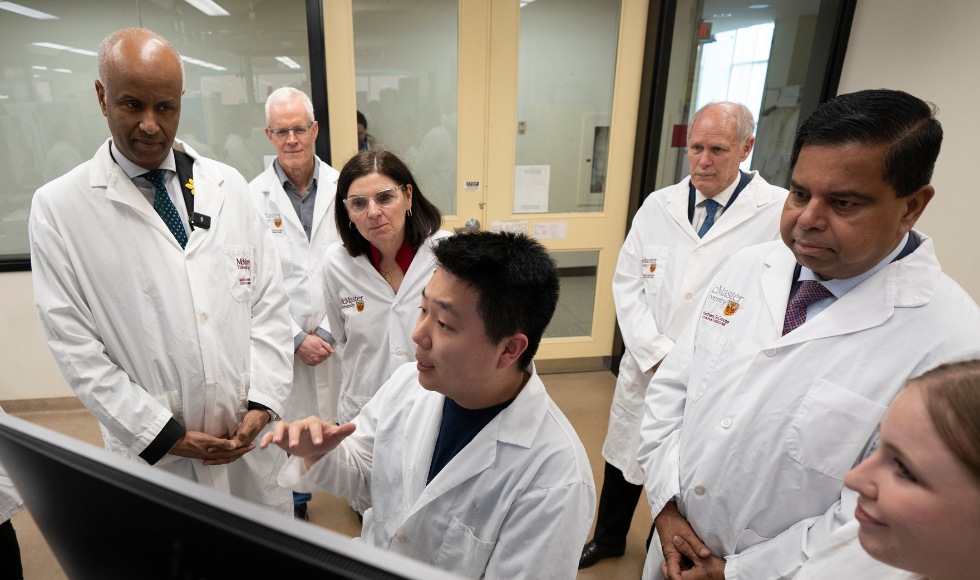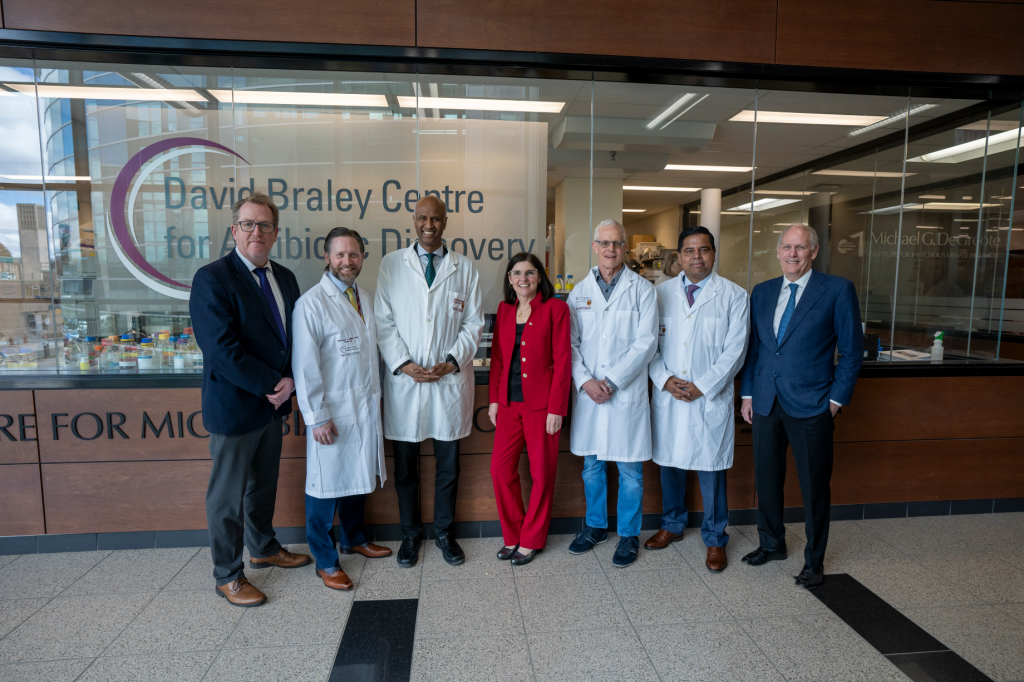A win for Canadian research: Ottawa boosts funding for graduate students, research grants

Ministers Ahmed Hussen, Filomena Tassi and Gary Anandasangaree at the Michael G. DeGroote Institute for Infectious Disease Research at McMaster, with students, Professor Eric Brown and McMaster President David Farrar. The ministers announced increased support for core research funding agencies, Indigenous research, and for master’s, doctoral and postdoctoral scholars across the country. (Photos by Georgia Kirkos, McMaster University)
The federal government announced a historic funding increase to support the robust research and innovation ecosystem at McMaster and other universities, as well as significant boosts for early-career Canadian scholars, and Indigenous research.
Federal ministers and MPs visited McMaster Friday afternoon to share the welcome news of $1.8 billion in new funding for Canada’s three core federal granting agencies — the Social Sciences and Humanities Research Council (SSHRC), the Natural Sciences and Engineering Research Council of Canada (NSERC) and the Canadian Institutes of Health Research (CIHR).
Minister of International Development Ahmed Hussen told McMaster researchers and students, “Today’s announcement is a win for Canadian research.”
“Canada is home to cutting edge research facilities, and this funding is exactly what we need to help the next generation of scholars succeed. Through Budget 2024, we’re making sure industries can recruit top talent, stay competitive, and keep pushing the boundaries of innovation.”
Hussen was joined by Gary Anandasangaree, minister of Crown-Indigenous Relations; and local MP and minister Filomena Tassi, who is responsible for the Federal Economic Development Agency for Southern Ontario.
Together, they visited the McMaster Indigenous Research Institute (MIRI) and the Michael G. DeGroote Institute for Infectious Disease Research (IIDR).
“As an institution consistently ranked as one of Canada’s most research-intensive universities, McMaster is very pleased to welcome our government partners to celebrate Budget 2024’s significant investment in university research,” McMaster President David Farrar said.
“Supporting graduate students and researchers will fuel the innovation needed to deliver transformative economic opportunities for Canada.”
At IIDR, a world-leading centre of interdisciplinary infectious disease research, “the ministers heard directly from students about how the research funding contained in the budget will support them in their critical work,” Farrar said.
“Graduate students across the university will benefit from this government investment as they study and contribute to world-leading research, make new discoveries and become tomorrow’ s research leaders and entrepreneurs.”
The federal government can make an investment, “but we need the people and the researchers to make it happen,” Tassi said at the announcement.
“We all know the incredible work happening here at McMaster and the work that continues to happen with hands-on learning, research and innovation.”
Indigenous researchers and communities

The federal government is investing $30 million in funding over three years to support Indigenous participation in research, with $10 million each for First Nation, Métis, and Inuit partners.
On a visit Friday to the McMaster Indigenous Research Institute (MIRI), the ministers learned about McMaster’s many ongoing community-engaged research initiatives, the university’s new master’s degree in Indigenous Studies — the first of its kind in Southern Ontario; and the new McMaster Indigenous Bursary Program, which reduces financial barriers and supports the success of Indigenous students.
In the fall, MIRI created a comprehensive primer for Indigenous research, offering a toolkit for scholars and community members across Canada to co-create culturally appropriate, impactful and meaningful research in partnership with communities.
“It was clear to me on campus today that McMaster is an innovative institution that is already leading the way on Canadian research and innovation,” Anandasangaree said.
“With a new large investment from Budget 2024 — more than $3.5 billion — that momentum is going to keep on going. The federal government is placing its confidence in Canadian jobs, researchers, and technology, all while making education more affordable and accessible.”
Support for graduate, doctoral and postdoctoral scholars

Tuesday’s federal budget included $825 million over five years to foster the next generation of research talent, with $200 million each year to increase the annual value of master’s scholarships to $27,000; doctoral scholarships to $40,000, and postdoctoral fellowships to $70,000.
The funding will also raise the number of research scholarships and fellowships supporting 1,720 more graduate students or fellows each year. The enhanced suite of scholarships and fellowship programs will be streamlined into one talent program facilitating better access for graduate students.
“It’s very encouraging to see our government partners recognize that a prosperous future and a strong economy with well paying jobs depend on Canada’s innovators, entrepreneurs, and researchers,” said Andy Knights, McMaster’s vice-president of Research.
“At McMaster we see so many of our students and graduate students go on to become some of our best researchers and entrepreneurs. That path has become increasingly tough for young people and these new investments in their success will pay dividends and contribute greatly to Canada’s prosperity.”
The importance of increasing the federal government’s graduate student support was a key finding in the work of McMaster’s recent Task Force on Graduate Funding. Its final report, including recommendations in five key areas, was recently released.
